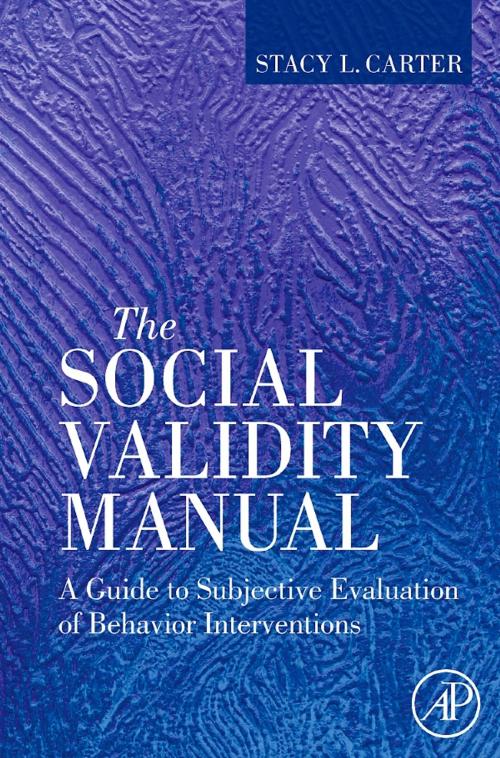The Social Validity Manual
A Guide to Subjective Evaluation of Behavior Interventions
Nonfiction, Health & Well Being, Psychology, Social Psychology, Cognitive Psychology| Author: | Stacy L. Carter | ISBN: | 9780080954042 |
| Publisher: | Elsevier Science | Publication: | October 1, 2009 |
| Imprint: | Academic Press | Language: | English |
| Author: | Stacy L. Carter |
| ISBN: | 9780080954042 |
| Publisher: | Elsevier Science |
| Publication: | October 1, 2009 |
| Imprint: | Academic Press |
| Language: | English |
Applied Behavior Analysis is the science of applying experimentally derived principles of behavior to improve socially significant behavior. The research and application of ABA contributes to a wide range of practical areas, including AIDS prevention, education, gerontology, language acquisition and parenting, and ABA-based interventions have gained particular popularity in the last 20 years related to teaching students with autism spectrum disorders. Social Validity, a concept used in such behavioral intervention research, focuses on whether the goals of treatment, the intervention techniques used and the outcomes achieved are acceptable, relevant, and useful to the individual in treatment. Judgments are made (often via clinical trials) about the effects of the intervention based on statistical significance and magnitude of effect. Essentially, social validity alerts us as to whether or not the ABA-based intervention has had a palpable impact and actually helped people in ways that are evident in everyday life.
This clinical research volume offers a detailed evaluation of the extant findings on Social Validity, as well as discussion of newly emerging factors which reemphasize the need for well-developed methods of examining SV. Basic conceptualizations, measurement, research findings, applications, ethics, and future implications are discussed in full, and novel recommendations relating back to clinical treatment are provided. The volume will give readers a firm understanding of the general concept of SV, help them become familiar with the research methods and findings, and teach them how to establish and evaluate the Social Validity of individual interventions and treatment programs.
- Consolidates literature broadly distributed across journals and book chapters into single source
- Provides discussion of SV in greater depth and breadth than is found in other sources, which generally just focus on general conceptualization and broad research findings
- Describes how concept of SV can be influential in numerous areas of clinical practice
Applied Behavior Analysis is the science of applying experimentally derived principles of behavior to improve socially significant behavior. The research and application of ABA contributes to a wide range of practical areas, including AIDS prevention, education, gerontology, language acquisition and parenting, and ABA-based interventions have gained particular popularity in the last 20 years related to teaching students with autism spectrum disorders. Social Validity, a concept used in such behavioral intervention research, focuses on whether the goals of treatment, the intervention techniques used and the outcomes achieved are acceptable, relevant, and useful to the individual in treatment. Judgments are made (often via clinical trials) about the effects of the intervention based on statistical significance and magnitude of effect. Essentially, social validity alerts us as to whether or not the ABA-based intervention has had a palpable impact and actually helped people in ways that are evident in everyday life.
This clinical research volume offers a detailed evaluation of the extant findings on Social Validity, as well as discussion of newly emerging factors which reemphasize the need for well-developed methods of examining SV. Basic conceptualizations, measurement, research findings, applications, ethics, and future implications are discussed in full, and novel recommendations relating back to clinical treatment are provided. The volume will give readers a firm understanding of the general concept of SV, help them become familiar with the research methods and findings, and teach them how to establish and evaluate the Social Validity of individual interventions and treatment programs.
- Consolidates literature broadly distributed across journals and book chapters into single source
- Provides discussion of SV in greater depth and breadth than is found in other sources, which generally just focus on general conceptualization and broad research findings
- Describes how concept of SV can be influential in numerous areas of clinical practice















